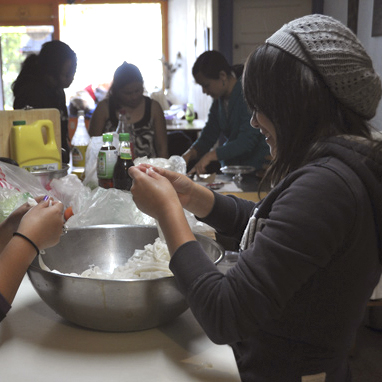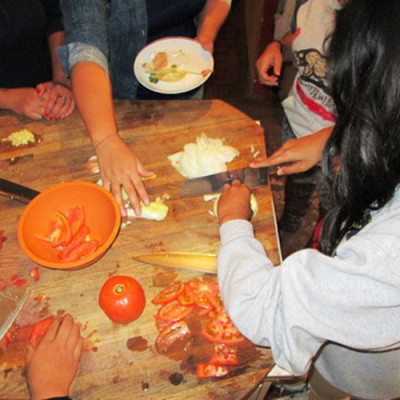Polishing brighter beauties in Oakland’s fight against child sex trafficking

Who Wants to Grate the Ginger?: Food as Intervention
November 6, 2013
OUSD PASSES Disaggregated Data Resolution
June 16, 2016
October 31, 2013
by Mark Fisher
Polishing brighter beauties in Oakland’s fight against child sex trafficking – SF Examiner
“Do you feel like love is missing in your life?”
Banteay Srei Program Manager Nkauj Iab Yang dropped this penetrating question on six teenage girls to chew on during the stir-fry meal they prepared together.

Banteay Srei is an Oakland non-profit dedicated to empowering young Southeast Asian women who were, are being, or are at risk of becoming commercially sexually exploited (CSE). Their model of culturally relevant solutions for girls with marginalized and even invisible ethnicity in Oakland is designed to create “a generation of fierce, independent, and self-empowered young Southeast Asian women.”
To each girl, they enlighten and reinforce the truth that she belongs to a grand and lasting cultural story. One program that helps achieve this goal is a weekly Southeast Asian Unity through Cultural Exploration (SAUCE) traditional Southeast Asian cooking class and family-style dinner, where this conversation occurred.
One of Banteay Srei’s foundational principles is being non-judgmental. Yang demonstrated to them that no judgments also means no secrets—at least not within the “family.” And she proceeded to share how she empowered herself to find love at 12.
In hindsight, some of Yang’s decisions and actions at that difficult stage of life were neither advisable nor prudent. Yet she stated, “I needed to recognize what empowerment looked like to me then and be OK with it. Instead of keep telling myself that it was stupid.”
Yang’s transparent wisdom about her own past allowed her rapt audience to reach the same conclusion about how they have sought love, too. At Banteay Srei, being non-judgmental means not judging yourself, either.
As she concluded, Yang presented personal wisdom in the form of a mission statement that the girls could consider for themselves: “How do I take care of me and take care of the people I love?” She then pointedly emphasized, “which includes all of you.”
That sincere and authentic love, unlike the cruel counterfeit proposed by sex traffickers to exploit vulnerable girls seeking it, is Banteay Srei’s secure and binding mortar filling the gaps in these girls’ lives, drawing them together as a family. Teaching, demonstrating, and proving a love that encourages and empowers their beloveds is the essence of Banteay Srei.
In the East Bay, 60% of girls who are victims of CSE were first sold before the age of 14. And over half of them do not realize their exploiter does not have their best interests in mind. A study by the National Academy of Sciences identified these as child CSE risk factors, which are common among the girls served by Banteay Srei: lack of resources, social isolation, underresourced schools and communities, peer pressure, and discrimination.
Participants in Banteay Srei usually begin while in middle school. In the Self Reliant and Empowered Individual (SREI) program, they learn about women’s health, overcoming violence, healthy and unhealthy relationships, communication, and self-empowerment. Amy’s* summary was: “how to build a confident and secure personal foundation, recognizing when you’re being recruited to be commercially sexually exploited, and how to get out of a bad relationship.”
Amy joined Banteay Srei three years ago when she was in 7th grade. An “overachiever since childhood,” attending college has been a lifelong dream. She then tenderly shared that upon reaching middle school, “I got off track and came here.” At Banteay Srei, “they put me back on the right track.” Upon reflection she said, “This is my second family.”
Now a high school sophomore, Amy cast the vision for her future: earn a psychology degree at UC Berkeley and work as a youth therapist or case manager for Banteay Srei or the East Bay Asian Youth Center (EBAYC). She wants to help kids without safety nets: “I could be their support system.”
Amy is now part of the support system for program participants. She applied to become a Bong Srei (“older sister” in Cambodian language) at Banteay Srei. So she now is a training facilitator, a challenging responsibility that develops her leadership skills. Rather than a school project, she revealed that her grade in this role will be increased attendance in her classes, “I want more girls to attend so that the class expands.”
Joy* also became a Bong Srei during her three years of volunteering at Banteay Srei. During this time, she has helped with outreaches to local schools to recruit program participants, fund-raising events for organization support, and facilitation of SREI workshops. Looking back on how she “grew a lot of leadership skills,” Joy acknowledged that she didn’t realize it was a deliberate process by staff members at the time. “I just thought they were trying to get me out of my shell,” she said.
Joy echoed the sentiment of Amy and others here: “It’s like another family to me. They are much more like family members than mentors to me—we bond.”
Beautiful gems polishing each other, becoming brighter and bolder.
*Pseudonymns


